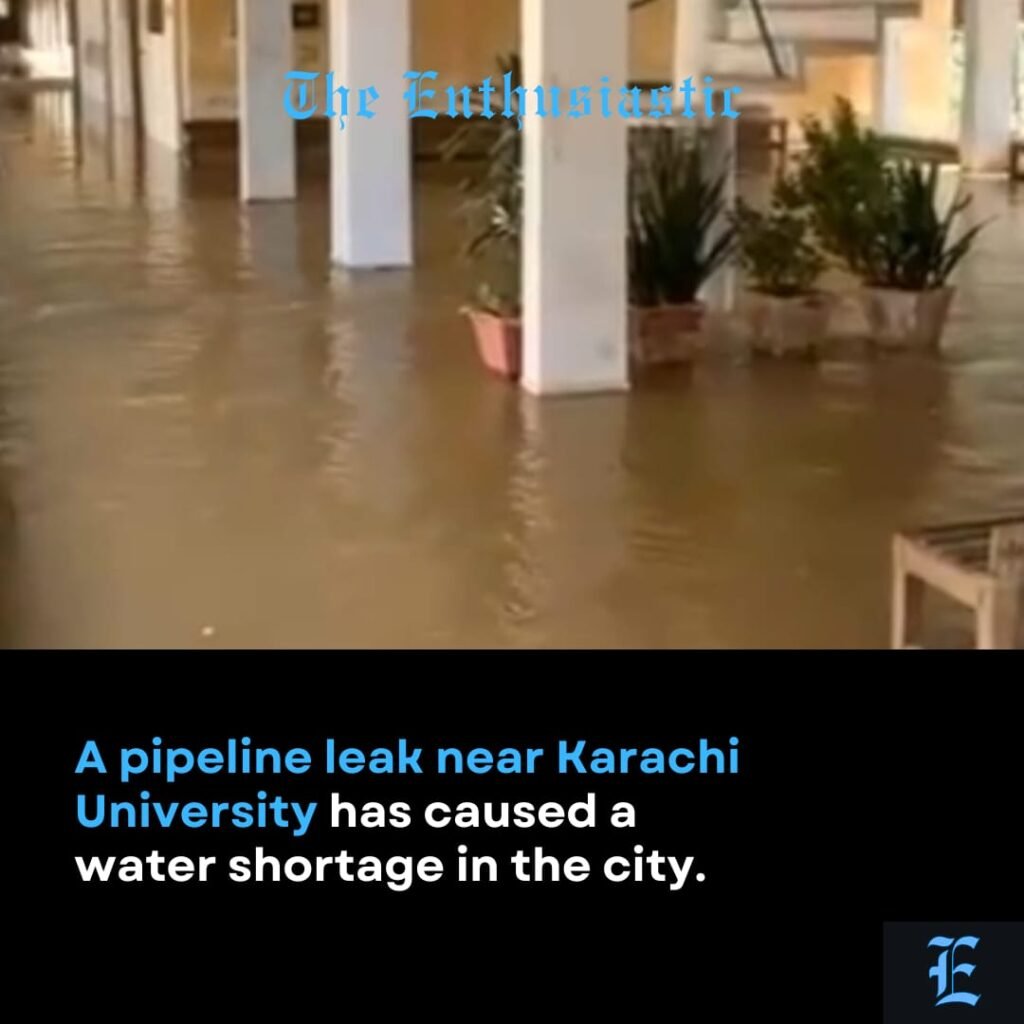Major Pipeline Leak Floods Karachi University and Triggers Citywide Water Crisis

Table of Contents
💧 Overview
On Tuesday, a massive water pipeline leak near the University of Karachi caused severe flooding across the campus, particularly in the residential zones. The leak has not only disrupted life within the university but is also expected to lead to a significant water shortage across multiple areas of Karachi, impacting millions of residents.
🏫 Flooding at the University Campus
The leak led to widespread flooding in the University of Karachi’s residential area, with water gushing into homes and damaging property. Students and staff members living in these quarters reported scenes of chaos, as furniture, electronics, and personal belongings were submerged in the rising water.
The situation grew more serious when electricity was cut off in the affected areas as a safety precaution. Many residents were forced to evacuate and have since taken refuge in university guest houses and temporary shelters provided by the administration.
🛠️ KWSC Confirms the Leak and Begins Emergency Repairs
The Karachi Water and Sewerage Corporation (KWSC) swiftly responded to the emergency. According to KWSC head Ahmed Ali Siddiqui, emergency repair teams were immediately dispatched, and water pressure in the damaged pipeline was reduced to minimize flooding and allow safer repair operations.
KWSC announced that the repair process would be non-stop and is expected to take up to 96 hours (4 days). The corporation has called on citizens to cooperate and be patient during this time.
🌇 Citywide Water Supply Disruptions
As a direct consequence of the pipeline damage, Karachi will face a massive daily shortfall of 250 million gallons of water. The city usually receives 650 million gallons per day, but with the pipeline out of service, the supply has dropped to 400 million gallons.
The areas expected to be most affected by the reduced water supply include:
Chanesar Town
Jinnah Town
Liaquatabad
Nazimabad
Pak Colony
Golimar
Shershah
Old City Area
Landhi
Korangi
PAF Base Masroor
⚠️ Water Board’s Advisory to Citizens
KWSC has urged all residents to conserve water and avoid wastage during the shortage period. The corporation emphasized that careful water usage is essential to help ensure that all areas receive at least minimal supply until the pipeline is repaired.
In an official advisory, the Water Board stated:
“We request the public to avoid unnecessary use of water. Store water wisely, delay car washing, and avoid watering gardens for the next few days.”
👥 Impact on Daily Life
This disruption has affected thousands of households across the city. Some residents are already relying on private tankers, which are now seeing increased demand and higher prices.
For those at the University of Karachi, the issue is even more immediate and personal. Many families have had to evacuate their homes due to standing water and lack of electricity, and university operations have been disrupted.
🚧 Repair Efforts Underway
Repair crews have been working around the clock to restore the damaged pipeline. Heavy machinery, flood pumps, and safety teams are in place, and updates are being shared regularly through local news outlets and KWSC’s official social media channels.
Ahmed Ali Siddiqui assured the public:
“We understand the urgency of the matter and are using all available resources to restore normal supply as soon as possible.”
💡 What Residents Can Do Right Now
While the repairs continue, here’s what residents in affected areas are advised to do:
Store clean water in buckets and tanks
Use water only for essentials like drinking, cooking, and hygiene
Delay activities that consume large amounts of water
Avoid hoarding or over-purchasing bottled water
Report any local leaks or wastage immediately to KWSC
🔚 Conclusion
The pipeline leak near the University of Karachi has turned into a major urban crisis, exposing the fragility of Karachi’s water infrastructure. As floodwaters are cleared and pipeline repairs continue, the coming days will require community cooperation, patience, and resilience.
Authorities have promised fast repairs and regular updates, but for now, the people of Karachi must brace for a temporary but significant reduction in water availability.
❓ FAQs
1. What caused the flooding at the University of Karachi?
A major leak in a water pipeline near the university led to large-scale flooding, especially in residential areas.
2. Which areas of Karachi are affected by the water shortage?
Several neighborhoods including Chanesar Town, Nazimabad, Korangi, and Landhi are affected by reduced water supply.
3. How long will it take to fix the pipeline?
KWSC says the repair will take approximately 96 hours (4 days).
4. What is the normal vs current water supply for Karachi?
Karachi usually receives 650 million gallons per day. Due to the leak, the supply is down to 400 million gallons.
5. What precautions should residents take during the crisis?
Residents are advised to conserve water, avoid unnecessary usage, and report leaks or misuse to authorities.
